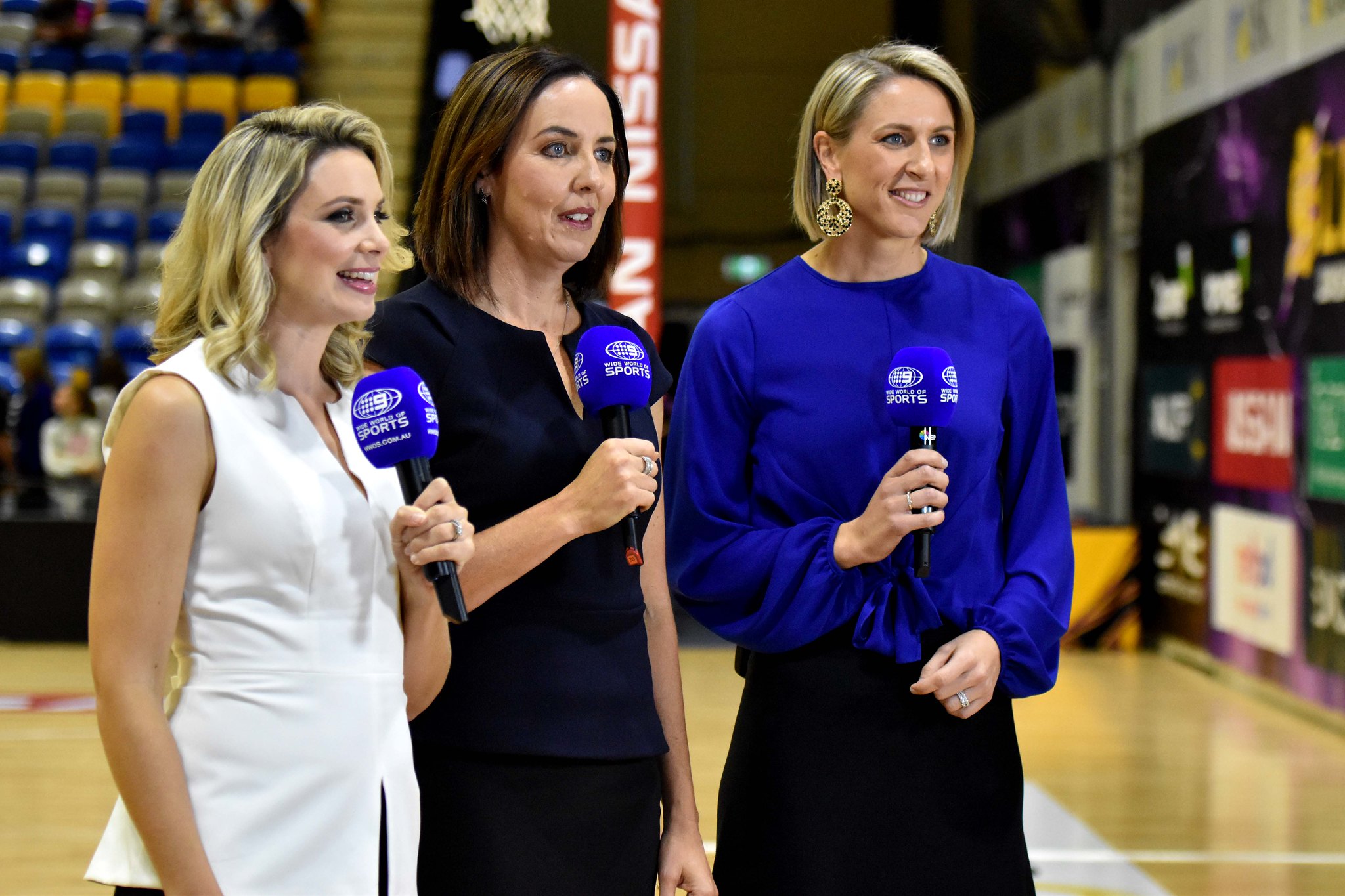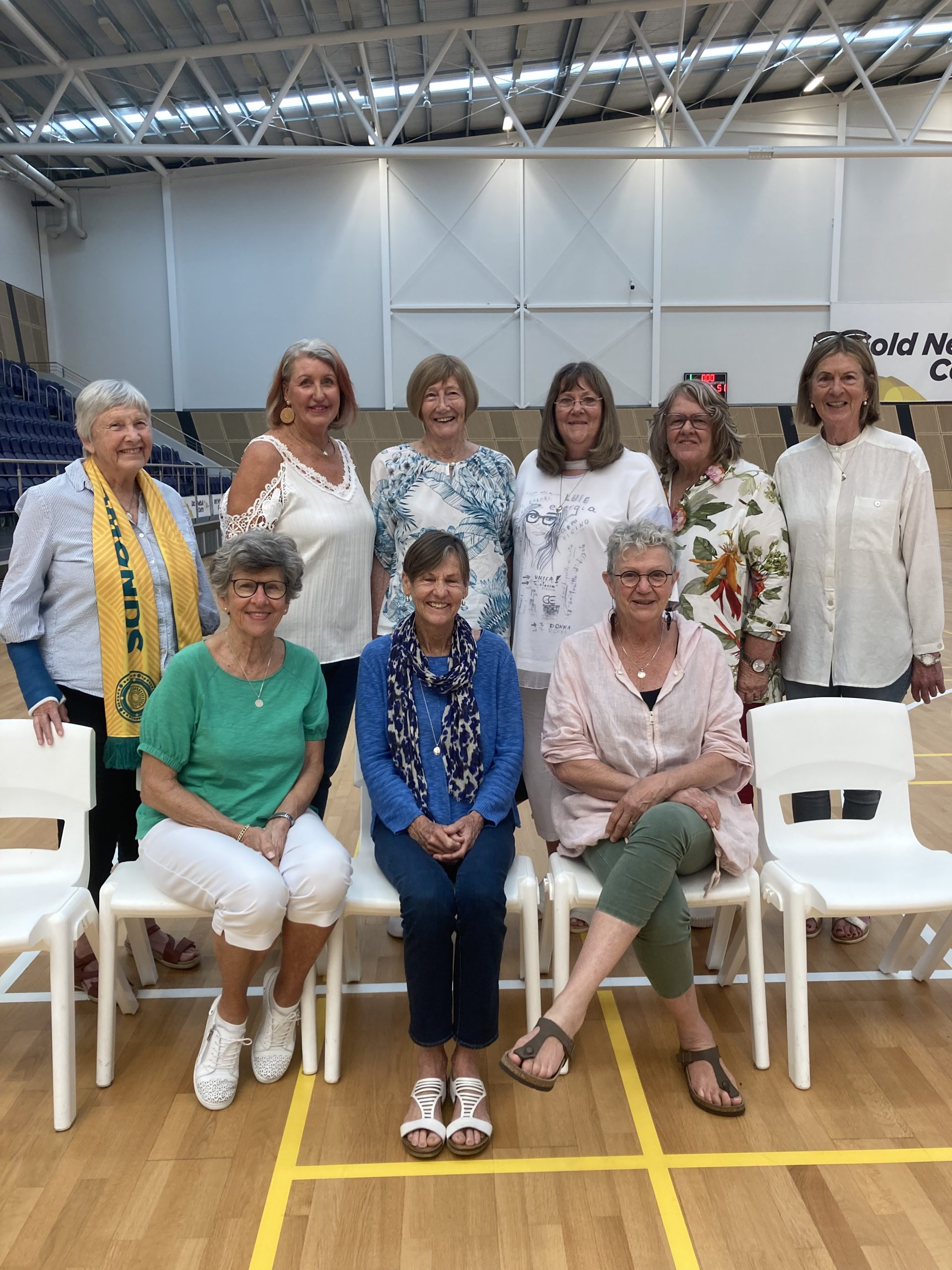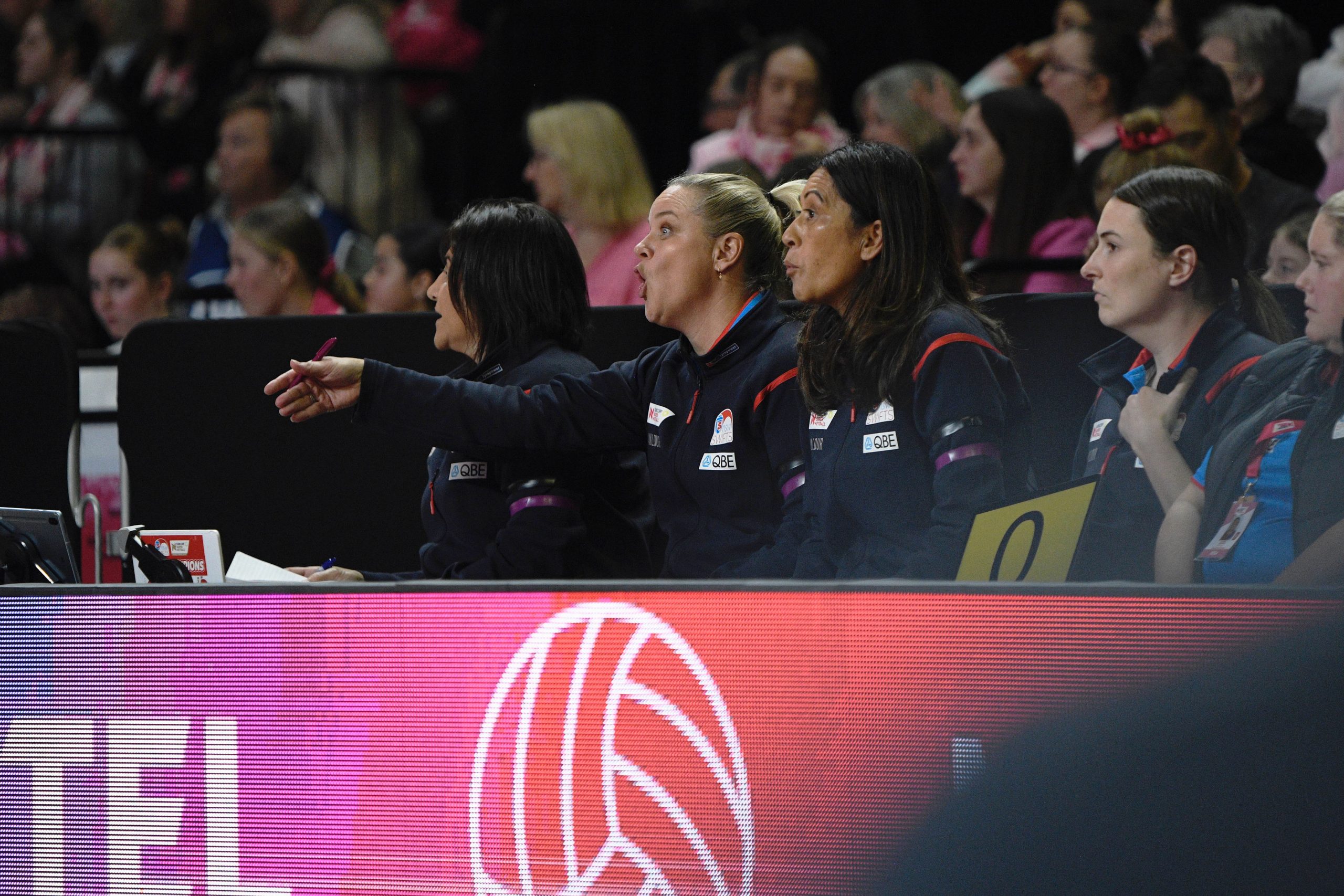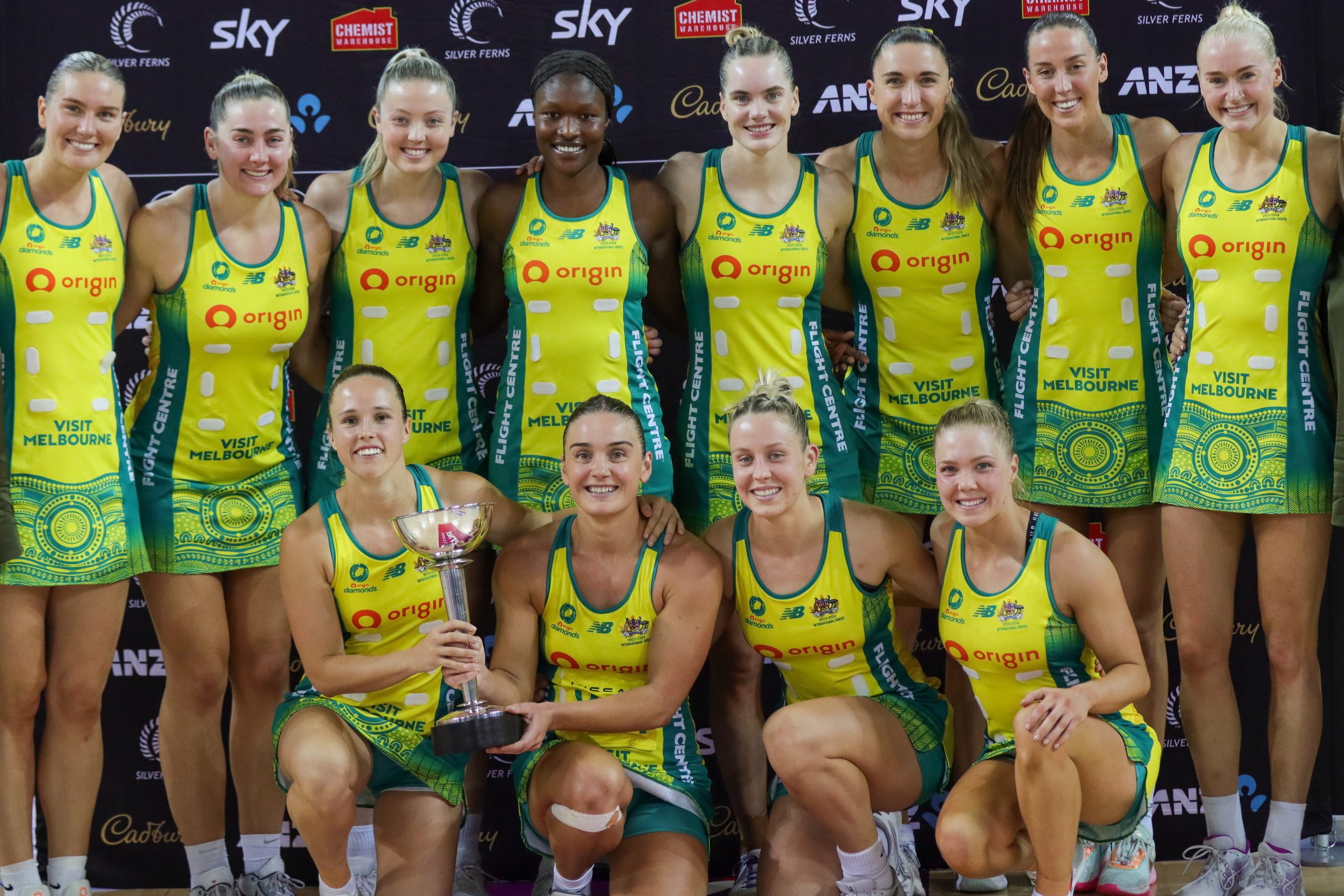With three Suncorp Super Netball athletes having experienced an anterior cruciate ligament (ACL) rupture this season, Netball Scoop dug into the archives for one of our most popular articles. Written in 2015, it was part of a two part series, covering the science of female athlete’s knee injuries (Part I), and this story of Liz Ellis’ injury and recovery (Part II). Ellis outlines the course of her rehabilitation, and the challenges she’s faced. The article is long, but many people have found some much needed inspiration from her thoughts.
It took just a split second for Liz Ellis’ world to shatter. To go from her position as the Australian netball captain with the Commonwealth Games just a heartbeat away, to a crumpled heap on the court. To go from purpose and control of a high profile career, to the anonymity of a surgical nightie and a hospital bed. On the 29th October 2005, Ellis ruptured the anterior cruciate ligament in her right knee. The same day, she also started the long road back.
Familiar adversaries. Australia versus New Zealand in a netball test match. Goal keeper Liz Ellis matched against the world’s premier shooter, Irene Van Dyk. As the ball entered the attacking third, they sprinted to the left of court. Ellis challenged for the ball, missed it and landed on the advertising hoardings at the side of the court.
She says, “I felt my right foot slip, my knee wobble, and then incredible pain. I fell to the ground and knew immediately that it was serious. One thousand thoughts went through my head in the space of five seconds. ‘Have I hurt my knee? Am I out of this match? Am I out of the Commonwealth Games? What about my holiday?’ The most overwhelming thing though was the unbelievably intense pain.”
Ellis was briefly assessed on court by the Diamonds physiotherapist, retreated to the bench, and almost immediately to the change rooms for a more thorough examination. What followed was worthy of a Laurel and Hardy slapstick comedy routine.
“The physio did the anterior draw test and said, ‘You’ve done your knee!’
I told him, ‘No I haven’t. I want a second opinion.’
So the doctor came in, did the test and said, ‘You’ve done your knee.’
I replied, ‘No, I haven’t. Don’t be stupid. Strap me up, I’m going back out to play.’
I made them do it, did some dodging and my knee seemed fine. I didn’t realise that the bleeding and swelling provided me with a sense that it was stable, when it really wasn’t. Anyway, I hobbled over and sat next to Norma (Plummer, Diamonds’ coach) and said, ‘I’m fine. I can go back on.’
Norma just looked at me as if I’d grown two heads. Luckily she knew better than me, so I had to stay put on the bench. I was in total denial, and spent the whole night icing, thinking the injury was just something little and I would be fine.”
The following day Ellis had her injured right knee scanned. She was accompanied by Julie Fitzgerald, Australian apprentice coach and also her long-time Swifts coach, the Diamonds’ team doctor, and Catherine Cox, who had “ditched the recovery session” to be with her best friend.
Ellis remembers, “When I walked out from the scan Coxy was standing at the door bawling her eyes out. I looked at her and said, ‘I guess I’ve done my knee then.’ It was a very emotional time for both of us. I went to the airport, headed home and started my rehab.”
Watching their captain crumple took a massive toll on the team. Ahead on the scoreboard at the time of Ellis’ injury, they went on to lose the match by a record margin of 25 goals. There was concern from the athletes about their friend, teammate and captain, and her crucial role in their Commonwealth Games campaign just three months down the track.
Ellis remembers, “We weren’t in a great space in terms of results against New Zealand at the time, so there was that immediate impact. Then in terms of the next 6 to 8 months for the team there was uncertainty about was I going to come back, would I be captain, what would the leadership look like, who was the next captain, how does she go about doing her job? I don’t think that situation had been planned for, so there was a lot of uncertainty around the team.”
While Ellis received emotional support following her injury from family, friends and people within the netball community, there was no official assistance at an administrative level. “There was no ongoing checking that I was ok, or how my rehab was going. You do expect that (employer support). In fairness, things are a lot different now at Netball Australia than when I was injured, and there were a lot of other issues going on at the time.
“My difficulties with my knee really did get pushed into the background though. I didn’t want to be putting my hand up for help, because the team was preparing for the Commonwealth Games, and I didn’t want to be disruptive. But I felt that five minutes ago I had been a vital part of that team. I also had to drive that (rehabilitation) myself which was a challenge, as I had never had a major injury before.”
The Players Association has since worked in tandem with Netball Australia to put significant supporting structures around injured athletes. However, at the time of Ellis’ injury, there wasn’t even a psychologist available for her to share concerns with, at a time when she was in considerable emotional distress.
“I was worried not only about my own career but the team. I was part of it and the leader of it. I also heard through the grapevine that some people were saying that I should retire because I was too old to come back successfully, or not to put too many resources into me because I might not come back. So all that was swirling while I was also trying to manage my injury, and I had nothing to grasp on to.”
On returning to Australia, Ellis’ first consultation was with Dr Grace Bryant, an experienced sports doctor who had provided medical care for the Australian netball team from 1991 until 1999. Further scans followed, together with appointments with a surgeon and physiotherapist. It was a venture into the unknown for Ellis, and she is still appreciative of the support given to her by her husband, Matthew Stocks.
A former rugby player whose own sporting career had been cut short by injuries, Stocks contacted a sports physiotherapist for advice and an appointment. Ellis remembers, “It was actually my husband who took the lead, which he never did through the course of my career. He was always so supportive, but had let me do what I needed to do. But in this situation Matthew took the first step for me, which was great because it really helped me to focus on what the next step was. It is so hard in that situation unless you are familiar with it, because you just don’t know what to do. So that put me on the road.”
Ellis started her “prehabilitation” immediately, a set of exercises designed to strengthen muscles around her knee prior to surgery. She had a reconstruction in the first week of November, and started to push herself from the very first postoperative day. “I got rid of my crutches after the first day and forced myself to walk. We had stairs in our house at the time, so that was one of my first challenges.
“I was obsessive about my rehab, and I could afford to be, because I had put all that time aside for the Commonwealth Games preparation.” Left shattered by the loss of her Games dream and the mental toll a serious injury takes on elite athletes, Ellis found some relief in being able to manage the physical aspects of her rehabilitation. She set her sights on returning for the Swifts first game next season, just shy of six months away.
Completing rehabilitation can be a challenge for many. Despite starting programmes with the best of intentions, life, expense and the dream of a magic wand cure interferes. Faced with the choice of a fully committed patient or a never ending packet of TimTams, physiotherapists will choose the former every time. Ellis was the perfect client, focused and meticulous.
She related, “Every day I was building forwards. Once I got over the initial shock, I spoke to people, had my plan, and my rehab was really quite smooth because I stuck to it religiously and didn’t miss a session. I went to a team mate’s wedding on New Year’s Eve and took my Swiss ball and my balance stuff with me. While everyone else was out at lunch the day before the wedding I was doing my rehab. The girls just laughed at me but they knew it was my personality.”
After her initial months with a sports physiotherapist, Ellis came under the care of Sean Mungovan, who at the time was the physiotherapist for the Swifts and the Diamonds. Ellis remembers, “Sean was just brilliant. He is passionate and dedicated and he wanted me to come back and be as good as ever. He really went to town in terms of research and putting a programme together for me.
“When I came back to netball I was the fittest I had ever been in my career.” Together the pair wrote down a monthly, three monthly and six monthly plan, with every session listed in detail. “I ticked each one off which really helped. On the days when I felt as if it was all too hard, I had something to look back on, so that I knew where I’d come from and what I’d achieved.”
One of the biggest adjustments for any elite athlete recovering from a serious injury is the concern as to whether they will be able to reach their former heights. It wasn’t a source of anxiety for Ellis, but she did acknowledge that very real possibility. “Very early on I realised that I wanted to finish my netball career on my own terms, even if it was playing C grade for my old club. Once you accept that, the fear is gone.
I spoke to Ali Broadbent (former Swifts and Diamonds team mate) who had two recons, and she found the hardest aspect was that mental one of whether or not she was going to be able to return to netball. As an athlete it doesn’t occur to you that bad things can happen, and when it does you realise that, hang on, yes they do. After every rehab session I thought, ‘right, that’s just made my knee stronger.’ So by the time I had done that every day for six months, I had mentally tested myself that I was as strong as ever.”
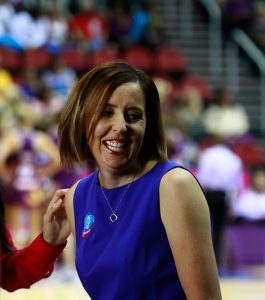
Liz Ellis – former Australian captain turned commentator, shared the story of her recovery from an ACL injury. Image: Simon Leonard
The Melbourne Commonwealth Games, held in March 2006, were another mental hurdle for Ellis to face. Faced with the choice of either fleeing overseas to get away from the overwhelming hype, or to go and acknowledge it, Ellis went to work for Channel 7. “It was very tough. I watched the team warm up, and thought, ‘Oh, they can function quite well without me.’ That is quite a hard realisation, and that my skills and knowledge weren’t really needed.
“I found it very difficult to watch the games and particularly lose the final, but that made me more determined than ever to come back. During that Games period, I got up every morning at 4am, went to work, finished on Sunrise at 9am, went to the Victorian Institute of Sport and trained till lunchtime, had a nap, and then went to the netball games or amused myself. I probably trained harder than I would have at home because I was so motivated.”
Ellis did make her return to the court 5 ½ months post injury. “My first game back was unreal and exciting and a relief, because I didn’t know that I was going to be able to do it.” She played in the State League for her old club Kuring-Gai, and remembers warming up on the outside courts at the Ann Clarke Centre, minus lights or crowd and on a bitumen court. She reflects, “I remember saying to myself that this is hardly the blaze of glory that I envisaged myself coming back in, but I didn’t care. I was back!”
She played against an old teammate, with just her mum and dad and a handful of other parents watching. “It was so low key, but I just felt like I was back where I belonged.” As she had hoped and dreamed and striven for, Ellis was able to take the court for the Swifts in late April in their first match of the season. “It took me that 2006 season to get back my leap and the last little parts of my agility. I was certainly as good as I’d ever been although I had probably lost about one centimetre of my vertical leap. While it’s crucial for a goal keeper, I was able to make up for it in other ways.” So successful was her rehabilitation, Ellis finds her formerly injured knee is now her ‘good’ one.
Having proven that she was again capable of matching it with the best, Ellis was reselected in the Diamonds. While she had received strong support from her franchise, Ellis was left underwhelmed by the lack of thought put into her national return. “I know the test arena is not for nurturing but for getting the best out of your players, but I also think that there needed to be a support system in place.
“It is really vital around leadership, and what happens if your captain is injured? You don’t just wash your hands of her and deal with it if or when she returns. You need some processes in place to give people clarity about the situation. When I came back into the team it was so hard for Sharelle and me. She had captained and so had I, but there was nothing formal about what we did from there on in.
“We were co-captains for a while, and then it reverted back to me being captain and her being vice-captain. Had that been set out ahead of time it would have been so much easier for both of us. It’s lucky we have a really good relationship and are good friends, and were able to work through it between ourselves. When it happened to Sharelle, Netball Australia had been through it and were much better at supporting her than when it happened to me.”
Frequently asked for advice on managing ACL injuries, Ellis has found herself in the role of a guru. She believes a vital part of her recovery was the empathy provided to her by athletes who had experienced similar injuries. “I had lovely support from past players who I didn’t really know very well, but who rang me with advice. It gives you the strength to carry on.” Ellis has in turn acted as a sounding board for younger elite netballers such as Courtney Tairi and Chelsea Pitman, through to grass roots players, who receive a proforma newsletter from the champion if they contact her for help.
Key pointers were given to her by former team mate Liz Boniello (nee Taverner) and Silver Fern opponent Anna Stanley (nee Rowberry). Boniello, after two reconstructions of her own, stressed to Ellis the importance of not “molly-coddling” her knee, but to start rehabilitation immediately. “The other great piece of advice came from a message Anna sent me to do my co-contractions. They are the most boring but best exercises you will ever do. Hamstrings and quads. Endless, boring, but I did them and it made a difference.”
In interviewing Ellis and other players about their knee injuries, most of them nominate it as one of the best things that ever happened to them. Surprising perhaps, but the enforced period of reflection gave Ellis new insights into herself and her career. “I learnt and grew so much, and also started to prioritise. I was quite realistic when I came back (to netball) about my place in the world. It does go by without you and you are not indispensable.
“I had a renewed love of netball. The last few years of my career were probably the best in terms of my performance, and I don’t know if I would have had that if I hadn’t been forced to walk away from the game for six months.”
The absence also made Ellis start to consider her life post retirement. “It did make me start my planning process. I think I transitioned really well because I had a little glimpse of what it was like, and I knew it wouldn’t be pleasant if I walked away with no future plans. So for me to have a couple of years to go through that planning process was important.”
Ellis believes that netballers taking part in this new semi-professional era need to look to the issues encountered by male athletes as they try to settle into a more mundane life post sport. Tales of massive weight gains, illicit drug use, alcohol abuse, domestic violence, marital discord and mental health issues have all received an airing in the media over recent years. It’s an area that Ellis finds fascinating.
She believes female athletes still tend to have dual roles, combining a sporting career with a home, work or student life. In comparison more support structures are placed around males during their sporting careers and they experience far greater adulation, often struggling to cope when that is withdrawn after retirement. It’s not been a problem for Ellis. She has managed the transformation from one of Australia’s greatest netballers to career woman, wife and mother with ease, for which she partly has a dodgy knee to thank.

